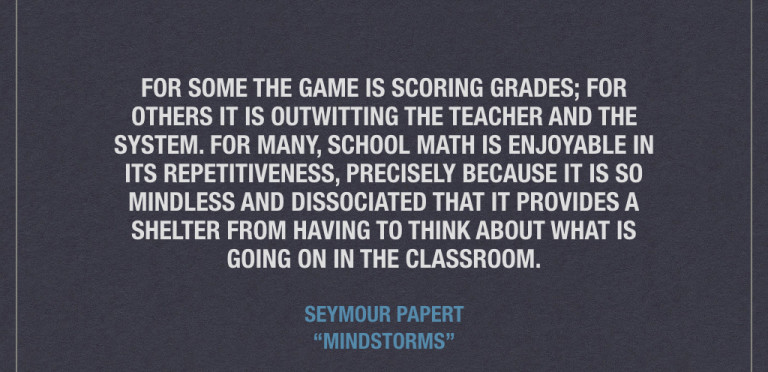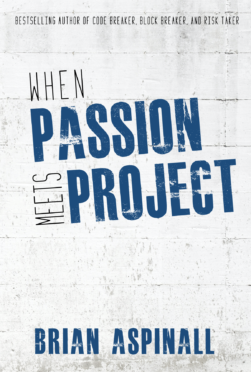I’ve been reading more and more about Seymour Papert as I continue my research on computational thinking. I’d like to highlight a body of work from one of his books. In Mindstorms, Papert continues to make good evidence of a constructivist approach to learning.
Constructivism is basically a theory — based on observation and scientific study — about how people learn. It says that people construct their own understanding and knowledge of the world, through experiencing things and reflecting on those experiences. When we encounter something new, we have to reconcile it with our previous ideas and experience, maybe changing what we believe, or maybe discarding the new information as irrelevant. In any case, we are active creators of our own knowledge. To do this, we must ask questions, explore, and assess what we know.
Source: http://www.thirteen.org/edonline/concept2class/constructivism/
Seymour Papert on “Mathland” excerpted from the Squeakers DVD from Gary Stager on Vimeo.
The more I read about a constructivist approach to learning, the more understanding I have of a true inquiry based / challenge based learning environment. These learning spaces encourage risk taking, trial and error and good feedback. These learning spaces are easy to assess but difficult to evaluate on a grade standard. If we truly want to personalize learning, shouldn’t we be personalizing evaluation?
Any further discussion requires a distinction between assessment evaluation. According to Growing Success, “assessment is the process of gathering information that accurately reflects how well a student is achieving the curriculum expectations in a subject or course. The primary purpose of assessment is to improve student learning. Assessment for the purpose of improving student learning is seen as both “assessment for learning” and “assessment as learning”. As part of assessment for learning, teachers provide students with descriptive feedback and coaching for improvement. Teachers engage in assessment as learning by helping all students develop their capacity to be independent, autonomous learners who are able to set individual goals, monitor their own progress, determine next steps, and reflect on their thinking and learning” (p. 36).
There are many ways in which we can assess. “Teachers will obtain assessment information through a variety of means, which may include formal and informal observations, discussions, learning conversations, questioning, conferences, homework, tasks done in groups, demonstrations, projects, portfolios, developmental continua, performances, peer and self-assessments, self-reflections, essays, and tests” (pg. 36).
You’ll notice there exists some overlap with assessment and evaluation as well as subtle differences. “Evaluation refers to the process of judging the quality of student learning on the basis of established performance standards and assigning a value to represent that quality. Evaluation accurately summarizes and communicates to parents, other teachers, employers, institutions of further education, and students themselves what students know and can do with respect to the overall curriculum expectations” (pg. 38).
The interpretation of this section suggests a constructivist approach to learning with personal experiences while embarking on prescribed standard paths. I want to celebrate the success of all students who are delivering their best work, reflections, questions and answers. The problem lies in assigning a numerical value to one’s best work when it’s not up to a standard of learning. Who in their right mind wants to continue learning when they are told their best is not up to par. Instead, can’t we focus on assessment for learning? We recognize that people learn in different ways and at different paces yet set expected ranges in which students should fall.
There is more to this discussion than just numerical grades. Time appears to be the constant in schools. We give students a set amount of time before evaluating what they were able to do during it, which seems contradictory to any research about the way in which people learn. Perhaps evaluation should become the constant and time the changing variable. Let’s create a mindset where we believe all kids can achieve given the right about of time and scaffolding.
I encourage you to also read the following:
The Last and Final Days of Report Cards by Andrew Campbell
Grading without Grading by Joe Bower

 For all the kids who grow up in a small town and think they don’t stand a chance. You do. I was once that kid.
For all the kids who grow up in a small town and think they don’t stand a chance. You do. I was once that kid.
There always seems to be contradiction with what teachers want to do in their classes for their students and what is required in the job.
Grades are the kryptonite to learning, as my VP likes to say.
“Will I lose marks if…”
“What isn’t this 10/10?”
“Is this assignment for marks?”
“What’s my mark right now?”
“What can I do to get more marks?”
and on and on it goes….
I think what you have highlighted shows that we ourselves are oriented more or less to constructivism in our assessment practices.
In other words, those like myself, oriented to a constructivist worldview, are more likely to see observational and conversational data as valuable and ‘real”, whereas those who aren’t would see it as “too subjective”‘.
My bottom line: there is nothing subjective about a teacher student relationship. Do I construct my understanding of each and every one of them, as learners? You betcha!